IN CASE YOU MISSED IT
Can’t get enough Hopkins Public Schools news? Get daily updates from our Facebook, LinkedIn, and Instagram feeds. If you don’t already follow us, here’s a snapshot of what you’ve missed.
HopkinsPublicSchools HopkinsSchools Hopkins-Public-Schools-270
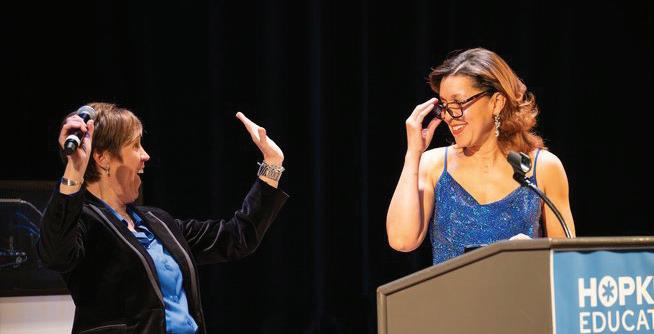
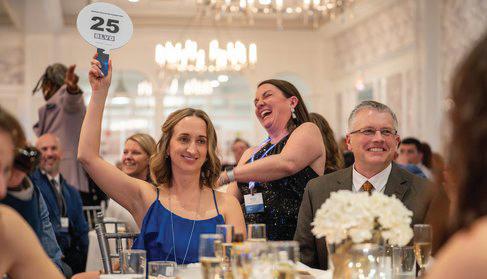
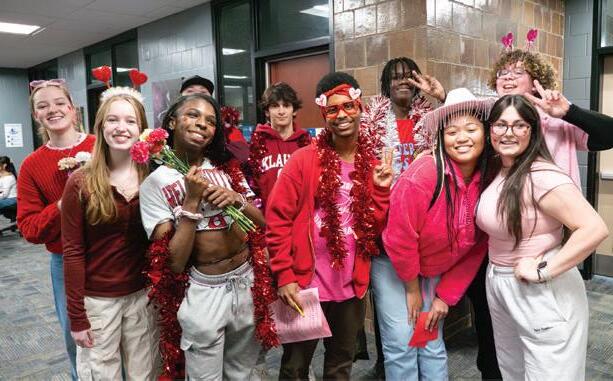


Hopkins Education Foundation March 5
Way to Ignite the Spark, Hopkins! We are so grateful to all of you who made Royal Bash 2024 such a wild and fun success at the Metropolitan Ballroom on Saturday. Your generosity helps us support Hopkins Public Schools in the form of Spark Grants (for educators), Awesome Fund grants (for student clubs), and our special project, Fueling Future Minds: Computer Science, Coding & AI. Take a look at all the fun we had!
Hopkins Schools
February 14
What a heartwarming day it was! The HHS Choir brought joy with their Heart-O-Grams, delivering flowers and treats to lucky recipients. A total of 275 Heart-O-Grams were delivered, showing the amazing support in our school community.
Hopkins Schools
January 29
Meadowbrook had a fantastic turnout at their Student Showcase Night last week! Caregivers got to see the shift from traditional to project-based learning, with displays of writing projects, National Parks adventures, open mic performances, cardboard arcade games, and more, highlighting classrooms as vibrant hubs of learning!
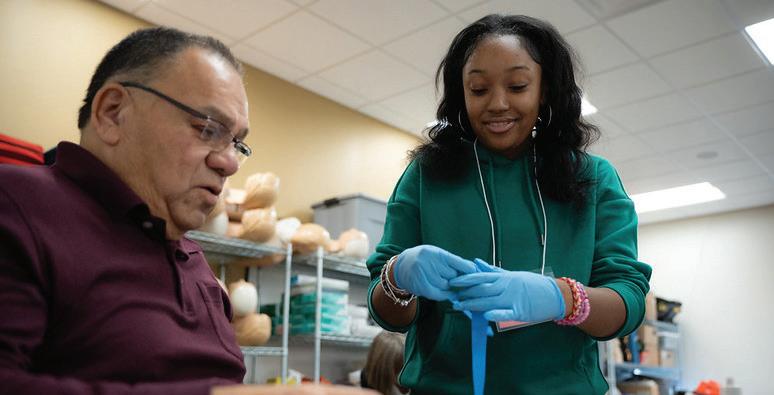
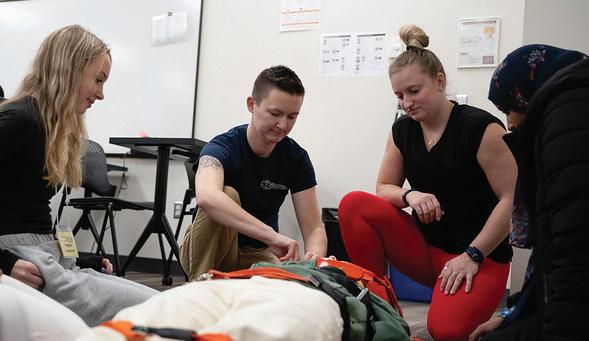
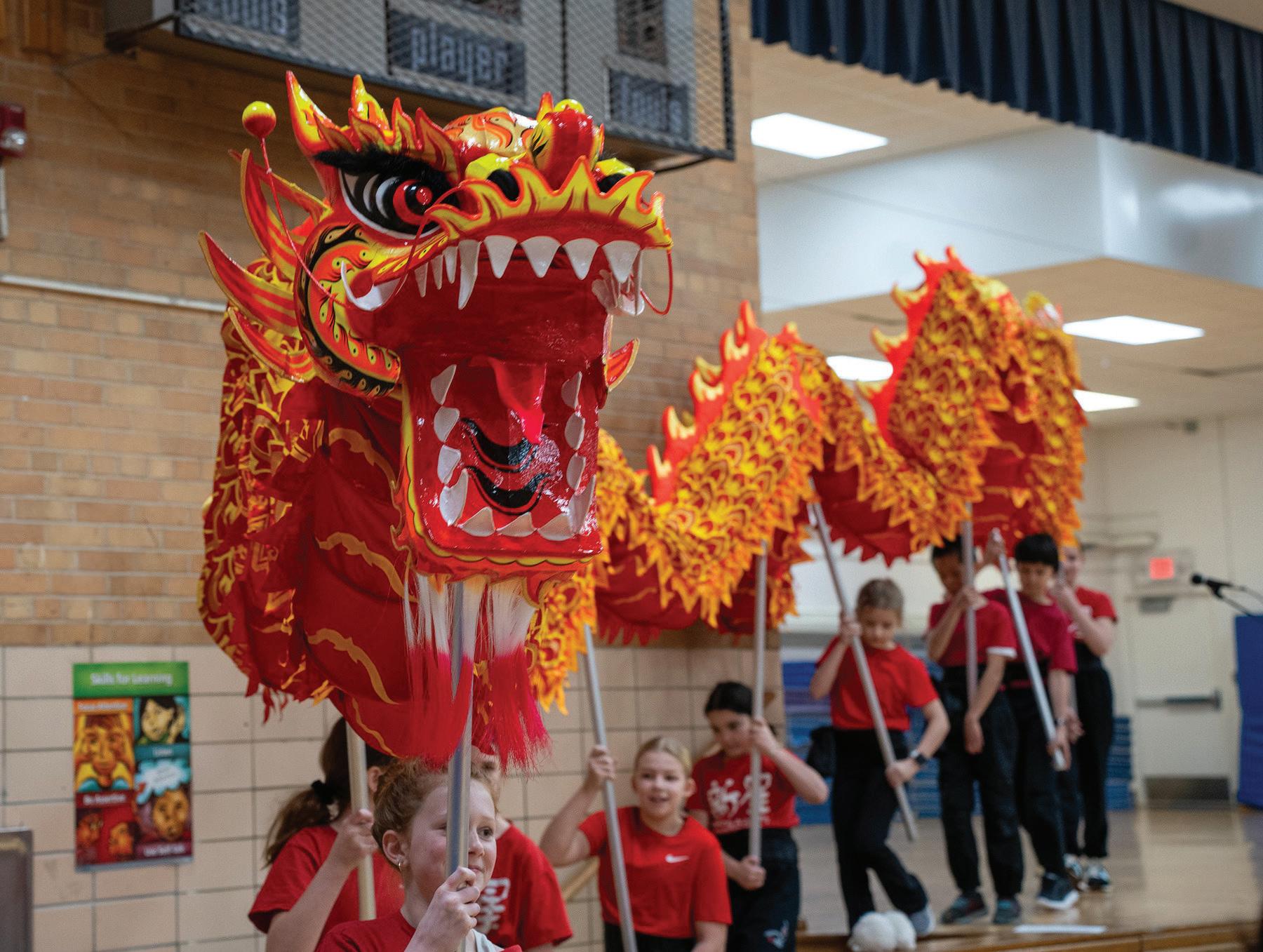
A GREAT PERFORMANCE!
Hopkins Royals usher in the Year of the Dragon with a captivating showcase.
2024 MINNESOTA TEACHER OF THE YEAR NOMINEES
Welcome New School Board Members
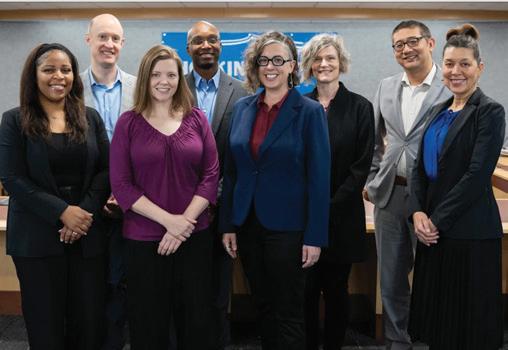
Hopkins VirtualEDU Redefines Online Learning
Hopkins Public Schools
December 14
In our latest podcast, we discuss Hopkins High School's new Certified Nursing Assistant (CNA) program. Starting in January, students can gain real-world medical experience and CNA certification in a state-of-theart lab. Thanks to the Hopkins Education Foundation for their support!
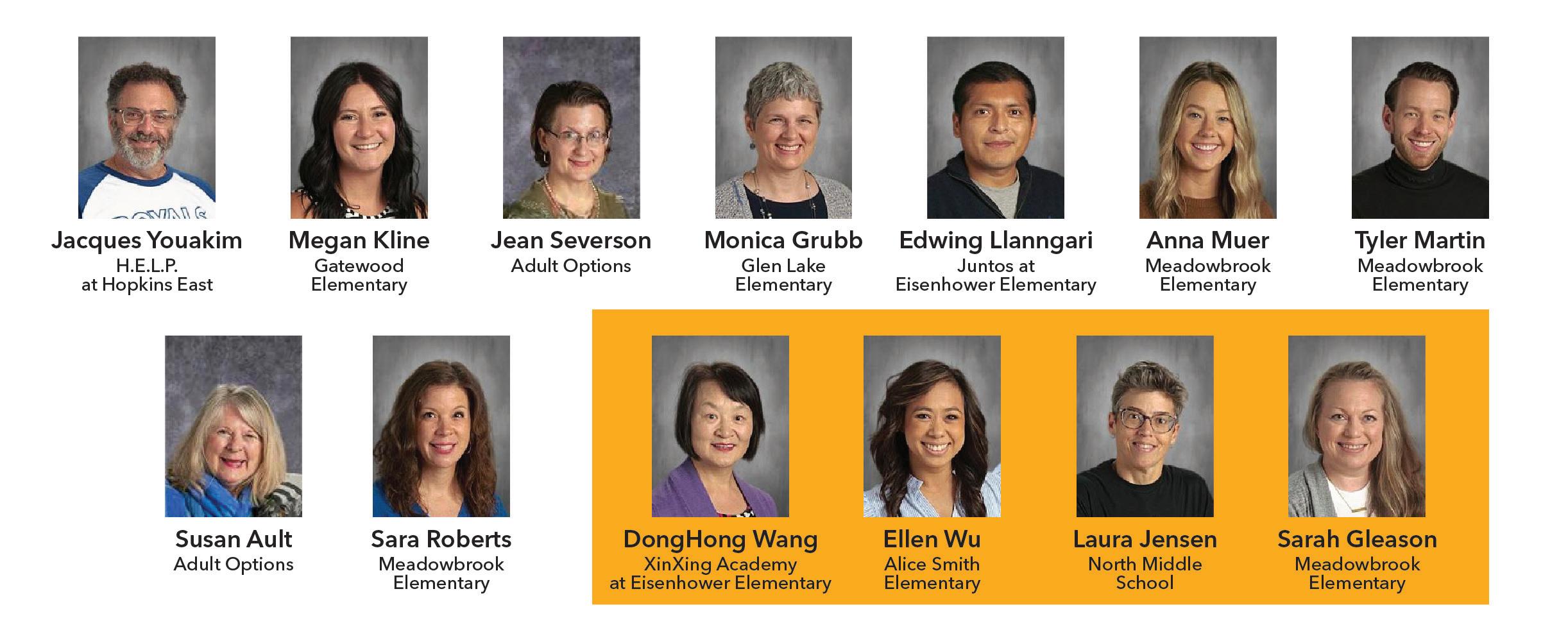
A total of 13 Hopkins Public Schools teachers were nominated for the 2024 Minnesota Teacher of the Year Award. Four Hopkins teachers are among the 27 who advanced to the semifinalist stage. They are denoted with a gold box. The Minnesota Teacher of the Year will be announced on May 5. Good luck, Hopkins teachers!
Congratulations to the four school board members who took the oath of office at the School Board meeting in January. Zhiming Zhao, Brooke Ann Roper, Kaj Thompson, and Shannon Andreson were sworn in, officially starting their four-year terms. We extend our appreciation for their commitment to serving our community and look forward to their leadership in the years ahead.
Alice Smith
Principal Earns Leadership Achievement Award
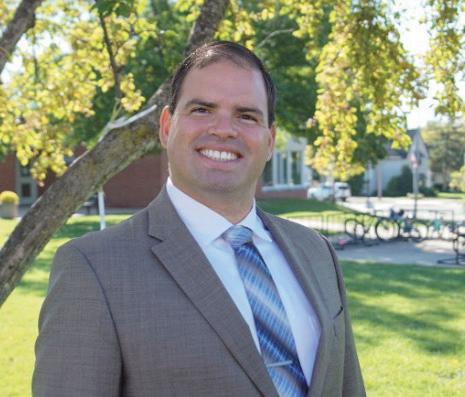
Eduardo Navidad, principal of Alice Smith Elementary, has been honored with the prestigious MESPA Division Leadership Award by the Minnesota Elementary School Principals’ Association (MESPA). This award highlights Navidad's exceptional leadership within MESPA's West Suburban Division.
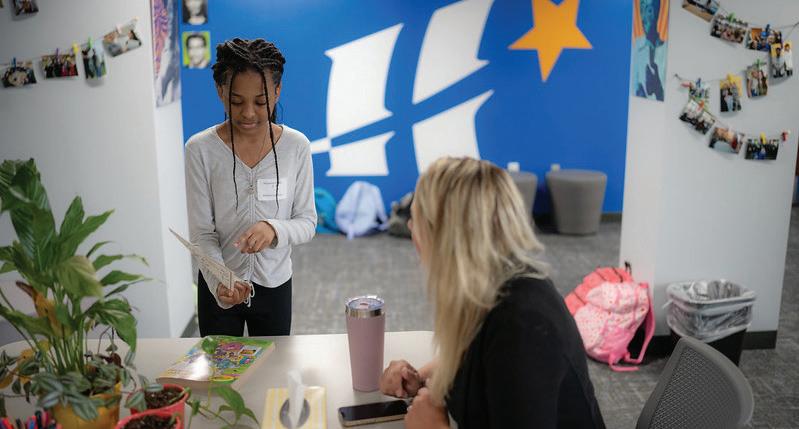

Minah Tezak is a junior in high school. She’s always been a good student, but she never really liked school. As a kid, she moved around a lot, which gave her exposure to several different schools, including online schools, but found she missed social interaction.
“I thought, ‘What if I could attend school in-person a few times a week and do the rest online?’” she said. “That is exactly what I have been looking for my entire life.”
When she heard that Hopkins VirtualEDU was offering just that—a blended (online plus inperson) option—she enrolled right away and has been at VirtualEDU ever since.
Located in Golden Valley in the Hopkins East Building, VirtualEDU is the only K-12 online public school in Minnesota to offer in-person instruction as well as a fully online pathway. The pandemic was the initial catalyst for VirtualEDU, but the learning model is far from pandemic learning.
A different structure
The idea of blending online and in-person instruction is not new, but it’s difficult for school districts to operationalize because it’s a transformative shift. Back in 2008, The Christensen Institute, a nonprofit dedicated to exploring how technology and innovation can transform traditional systems, suggested that online learning could provide personalization and address the teacher shortage, but stressed that getting the model right was essential to creating successful outcomes for students.
“The use of online learning shouldn’t just be to pipe in a virtual teacher that delivers one-size-fits-none, whole-group instruction,” said the Institute's co-founder Michael Horn in a November 2023 blog entry.
Tiffany Nielsen-Winkelman, Ph. D., is one of the co-creators of VirtualEDU. Her experience teaching elementary students online during the pandemic helped her see that online teaching, when done thoughtfully, could foster more equitable learning opportunities.
“We are breaking the myth that online learning is cold, lonely, and impersonal with our studentcentered, dynamic learning environment,” she said. “We take a multiage, family-style approach to amplify learning progression.”
Relationships and connections
VirtualEDU’s learning model is attractive to families and students whose needs are not met by a traditional school setting for a variety of reasons. During the pandemic, some students learned that they thrived in an online setting. VirtualEDU is not for everyone, but for some, it is life changing.
“VirtualEDU’s uniqueness resonates positively with the community and allows for us to have strong family engagement and support,” said Demond Johnson, associate principal of VirtualEDU.
October Lewandowski-Washington, transferred to VirtualEDU in November after starting the school year at an in-person high school. She wanted an option that was smaller and offered flexibility.
District Winter 2024
The
Community’s Guide to the
Public Schools ISD 270 1001 Highway 7 Hopkins, MN 55305-4723
Left and right: Blended learning students at VirtualEDU engaging with their teachers in the Hopkins East building.
Hopkins
Residential Postal Patron ECRWSS
The Community’s Guide to the
District Winter 2024
GET CONNECTED, STAY CONNECTED HopkinsSchools.org/update Hopkins VirtualEDU Redefines Online Learning, inside
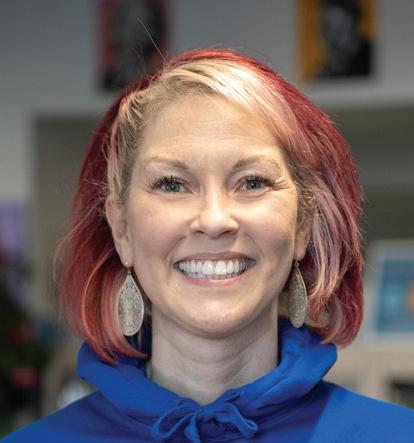
Becky Puchtel VirtualEDU
K-12 Special Education Teacher
Becky Puchtel has been an educator for 20 years with experience teaching at elementary, middle, and high school levels. After earning her teaching license in Early Childhood Education, Puchtel’s love of learning led her to pursue a Master's in Special Education.
Puchtel teaches Special Education at VirtualEDU and has created a community and connection with her students who learn remotely.
“It sounds strange to those who have not experienced VirtualEDU, but when your teacher is in your home and your dog, cat, brother, lizard, and mom have made a cameo appearance during our online Science class, it opens a whole new world of trusting and learning from each other,” Puchtel said. “We get joy from being a part of each other’s lives.”
What is one thing you wish everyone knew about Special Education?
I wish everyone knew that EVERY student have worked with who has a need for specialized education has a SUPERPOWER! They have learned how to cope, adapt, and get through some really difficult challenges. feel honored, every day, to get to teach my students and learn from them!
Describe a moment when you were really proud of your students.
In a recent discussion of a novel, students got vulnerable and shared their connection to how the main character was being treated — real experiences of how they’ve been judged because of their disability. By sharing, students connected and reassured each other they were not alone.
Nathan Motzko
2010 Graduate
Stats: Bachelor of Fine Arts from the Minneapolis College of Art and Design • Freelance Animator
Nathan Motzko, a freelance animator and illustrator based in Minneapolis, brings his creative vision to life across multiple mediums. His work spans collaborations with animation studios and advertising agencies across the United States, with some partnerships within his home city.

When he's not immersed in his creative work for clients or personal projects, you'll find Motzko unwinding and indulging in his love for video games. Through his artistry and passion, Motzko continues to make his mark in the vibrant creative scene of Minneapolis.
Was there a teacher or staff member who made a difference in your life?
John Sammler was one of my absolute favorite teachers. He was down-to-earth, hilarious, and always brought a great vibe to class. I struggled to maintain good grades in high school, but then I took his class and his enthusiasm when succeeded on assignments inspired me to believe in my ability to improve overall. He helped show me the joy you can bring people by just being yourself in every situation.
What is your advice for current Royals?
No matter what you end up doing in this world or wherever you end up going, try your best at what you’re interested in.
If it doesn’t work out or if that interest changes, know that that's okay! Just remember to love and trust yourself throughout all of it.
STUDENT VOICE
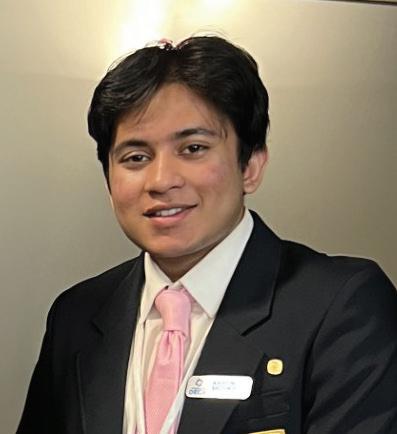
Aaron Siddiky Senior, Hopkins High School
Aaron Siddiky's time at Hopkins has been greatly influenced by his experiences in the business department and the career and technical education department. He is the president of the Hopkins DECA chapter and was elected as the vice president of Business and Industry, representing over 5,000 students in Minnesota. Siddiky is also a member of the Hopkins ProPEL program, where he eagerly pursues his interest in computer science. Through an internship at Advisory Aerospace, he engages in projects that appeal to his passion for technology.
What are your plans for life after Hopkins High School?
Next year I'll be attending Columbia University as a research scholar. I'm privileged to be one of 87 students to attend on a full ride. I'm also a The Gates Scholarship semifinalist. These are privileges that I'm happy to have moving into the next chapter of my life. look forward to majoring in computer science and economics and working on the startup that started here at Hopkins through the Columbia Venture Competition.
Tell us about your startup, AxaBlock, and its mission.
One of my proudest projects for DECA is this application blocker that helps teens and adults stay off their phones by financially incentivizing them. It's such a big part of my high school journey, because it's allowed me to use my computer science passion and mix it up with my entrepreneurial side. It's introduced me to this 'engineering for humanity' vision that have.
What’s unique about Hopkins?
I've had the opportunity to live on three continents, and go to various schools, but Hopkins is different. The peers that you talk to, the collective mindset, the sense of community, are all things that stood out to me and helped me come in and feel right at home. It's just been such an overwhelming experience of community in Hopkins that you won't find anywhere else.
It was also important for her to have stronger and more personal connections with her teachers.
“Class sizes are small—the teachers know us—and they don't let us fail,” she said. “There is always someone around who is trying to approach you, not in a strict way, it’s loving. It makes me want to do my work.”
VirtualEDU students start and end their days in community with other students and their teacher, whether they are in person or online in a Google Meet. Students experience in-person meetups and activities, community gatherings, and virtual social time. Online students even eat lunch together. VirtualEDU offers specialty programming like music, art, physical education, and world language. Its 32-member staff includes special services teachers and a social worker.
Innovation and collaboration for teachers
Emily Alvarez teaches kindergarten through fifth grade using dynamic grouping. Teaching the foundational skills like reading and math online to young children requires precision and strategy, but she also enjoys having the autonomy to build a new program. According to Alvarez, online programs need to adapt their content to be successful.
“We want to do school differently—and it looks nothing like it would in the classroom,” she said. “You can’t ask how you would teach your content in a virtual environment. You don’t. You build something new that meets students' needs and works in a virtual setting.”
Ben Dickens, a secondary learning facilitator, joined Hopkins Public Schools five years ago, working at the middle school level before coming to VirtualEDU. Online learning appealed to him because it allowed him to provide personalized learning for his students without the distraction of transitions, bells, and learning contained to specific times and spaces. In an online learning environment he can literally meet students wherever they are. In some cases, they participate while in the car on the way to visit a doctor or while traveling with their family. Students can take the learning with them rather than being left behind.
“That’s the best part of what we are doing here,” he said. “We are able to be creative. A lot of schools survived the pandemic and went back to the norm. We did not want to go back and lose the innovation that we discovered.”
MUSICAL GUESTS
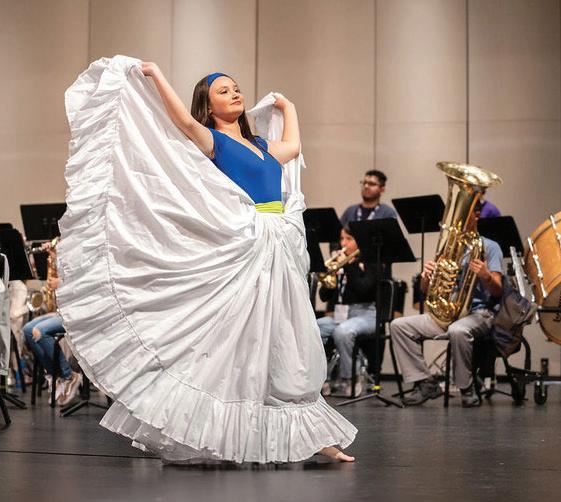
Hopkins High
In VirtualEDU, students can self-pace. Instead of eight blocks of learning, they focus on three at a time and explore the interconnections between the subjects.
Becky Puchtel, a special services teacher at VirtualEDU, enjoys how integrated her role is within the entire VirtualEDU community. In her previous positions, she was isolated from her general education counterparts. However, in VirtualEDU, the collaborative environment ensures that all educators engage with students collectively. Here, Puchtel fosters meaningful connections with every student, extending beyond those she directly supports with her services.
“What’s nice about online and blended learning is that I can work with students one-on-one and in a smaller group, but I can also go into other classrooms with their mainstream teachers,” she said. “I am not thought of as the special services teacher with her own program and students.”
Regina Johnson, who joined VirtualEDU after years of teaching math and talent development at what is now Hopkins West Middle School, has enjoyed interacting with students and colleagues in a more holistic way. While teaching math at VirtualEDU, Johnson integrates connections into other disciplines and content areas. This year, she challenged students to investigate the application of data in their science class. Johnson has enjoyed being seen as an all-around facilitator of learning, who is not limited to her content area by students and colleagues.
“This is near and dear to my heart as a math teacher,” she said. “Having a team of teachers and learning side-by-side with kids.”
HOLOCAUST REMEMBRANCE
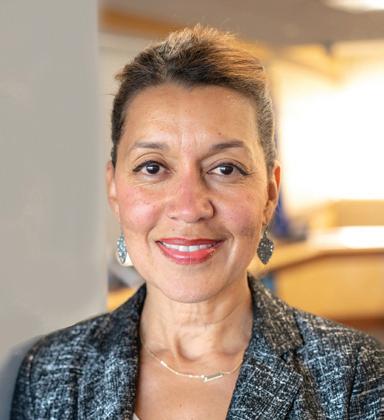
DR. MHIRIPIRI-REED
The Hopkins Advantage: Academic Excellence and Real-World Preparation
As a lifelong education leader, I vowed to enroll my own children in the public schools I would serve. I have done that. With my youngest now a sixth grader in Chinese Immersion at West Middle School, and my oldest a sophomore at Hopkins High School, I am so glad I made that choice and am now indebted to all of the teachers who have served my children so well.
Over the course of their educational journeys, my children—like many of yours—have had the opportunity to sit in classrooms and be in schools with students who quite literally represent our global society. In addition to superior instructional quality, our Hopkins students are exposed to 70-plus languages, diverse expressions of identity and ideas, and multiple ways of engaging in rigorous learning and solving complex academic problems. This is the Hopkins advantage.
In the intricate landscape of public education, misunderstandings often arise regarding the role of test scores in evaluating diverse school districts like Hopkins. While educators recognize that school quality encompasses more than just test scores, parents seek reassurance in academic preparation. Excelling in exams and standardized tests like the ACT are crucial indicators for college admission and future success. At Hopkins, we prioritize preparing students for these assessments, reflected in our consistently strong ACT scores and our graduation rates that surpass state averages.
So, why do schools with diverse populations do less well on standardized tests than schools that are whiter and wealthier?
Know a Hopkins student, teacher, or alumni we should feature? Email Michelle.Wirth@HopkinsSchools.org.
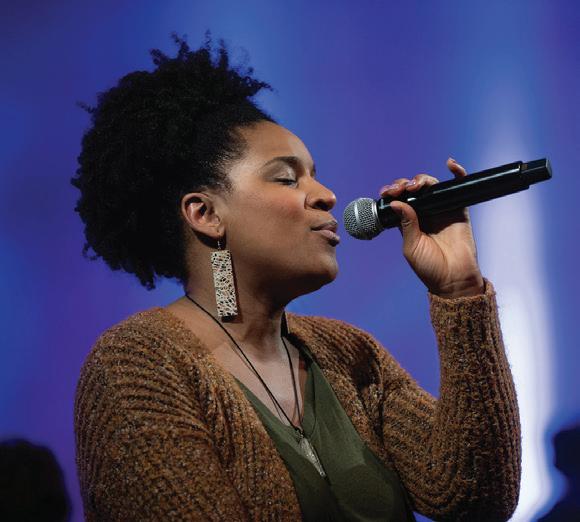
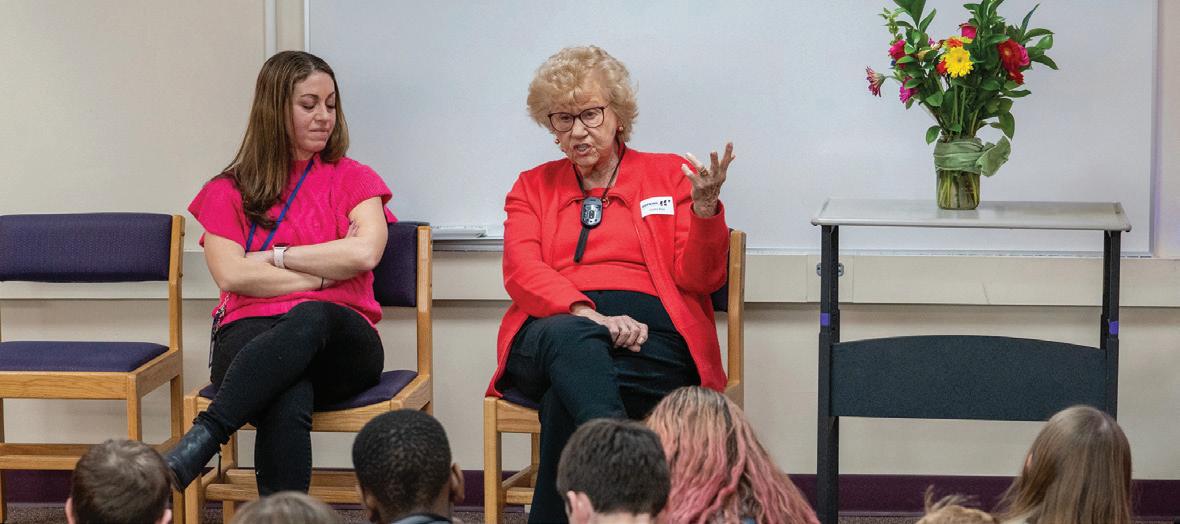
Glen Lake fifth graders were quiet—silent actually—for over an hour as they listened to a first-hand account of the Holocaust from survivor Reva Kibort. The great-grandmother of three Glen Lake students, Kibort told the students her harrowing experience living through multiple concentration camps when she was the same age as many of them are now.
At one point Kibort apologized to the students for how hard the stories were to hear but then said, “you need to hear this; you need to know this.” She explained how she and her sisters survived in cruel and unsafe conditions, witnessed executions, and lived under constant fear. Kibort attributed her survival, in part, to being with her sisters and the strength of being together.
Hearing the story from a person who experienced the Holocaust was powerful and made the experience personal and real. First-hand accounts of the Holocaust are becoming more rare as those impacted are aging out of being able to tell their stories.
Read more at bit.ly/4c0ihXd
Throughout our country, race and poverty are inextricably linked with families of color disproportionately impacted by poverty. There is a long-proven relationship between poverty and proficiency. Simply put, students from middle-class and affluent families have generated test scores that are higher than those of low-income students. This predictability has been a feature of our nation's high-stakes test results for decades. If we use the Minnesota MDE Report Card to compare average MCA scores of districts with similar demographics, Hopkins students do as well as, if not better than, similar counterparts.
At Hopkins, various features contribute to academic excellence for our students. These include strong participation and success in programs like Advanced Placement, College in the Schools, Career and Tech Ed pathways, and Bilingual programs. Additionally, our middle schools utilize the International Baccalaureate framework, a widely recognized program for gifted and talented students. Elementary experiences in music, art, health, and socioemotional programming enrich students' readiness for the academic challenges of middle and high school.
We need a comprehensive approach to assessing student progress. In Hopkins, we're developing a balanced assessment to evaluate proficiency and growth. We understand that students' abilities go beyond test scores, and we aim to capture the full scope of their learning. Factors like teacher quality, school safety, and sense of belonging are challenging to quantify but essential for student success.
We invite you to tour our schools and witness firsthand what makes Hopkins schools truly remarkable. You won’t be anything less than amazed.
 Dr. Rhoda Mhiripiri-Reed Superintendent
Dr. Rhoda Mhiripiri-Reed Superintendent
ALUMNI CORNER FROM SUPERINTENDENT ROYAL SPOTLIGHT Hopkins VirtualEDU Redefines Online Learning, continued from cover
The
School music department has already welcomed an impressive lineup of talent to perform with Hopkins High School musicians this year including Banda CEDES Don Bosco and R&B vocalist and former "The Voice" contestant, Ashley Dubose Hopkins will welcome more guest artists at the Hopkins High School Pops Concert on March 22 featuring performers from The Cowles Center TaikoArts Midwest, Capoeira Minnesota, and the Flipside Trio





















 Dr. Rhoda Mhiripiri-Reed Superintendent
Dr. Rhoda Mhiripiri-Reed Superintendent